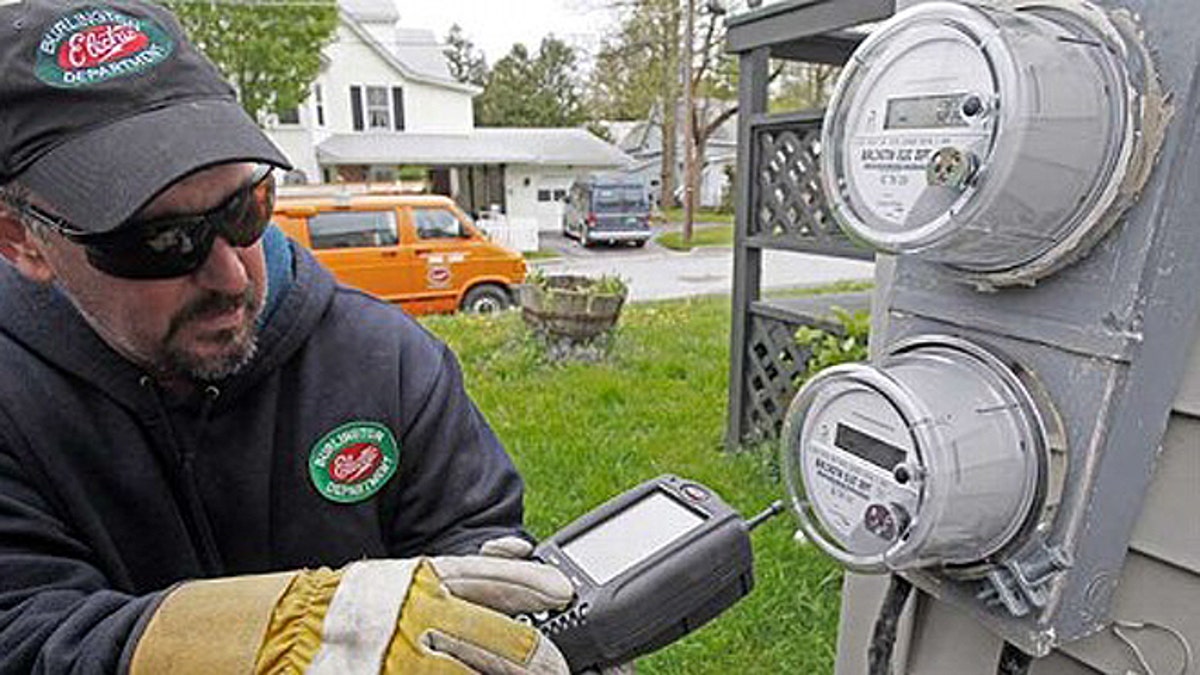
Utility companies across the country are have been steadily launching initiatives to install smart meters at customers homes, but many have protested, saying that it infringes on their privacy rights and may even cause health issues. (Toby Talbot/AP)
Utility companies across the U.S. are installing smart meters in customers’ homes, touting the technology’s energy-saving ways, but opponents argue that the meters are opening a Pandora’s box of privacy concerns.
The smart energy meters read electric or gas usage, and enable a power company to collect detailed usage data on a particular home or building. But the readings also gather personal information that some critics argue is too intrusive.
The information gathered from smart meters includes unencrypted data that can, among other details, reveal when a homeowner is away from their residence for long periods of time. The electric wattage readings can even decipher what type of activities a customer is engaged in, such as watching TV, using a computer or even how long someone spends cooking.
“It’s in the nature of technology to be neutral in the benefits and the risks; it’s how the info is used,” Allen Gilbert, executive director of the Vermont branch of the American Civil Liberties Union, tells FoxNews.com. “Look at smartphones. No one can argue the benefits of having one. But on the other hand, it’s the best tracking device.”
The Vermont ACLU has, in the past few years, participated in the privacy debate over smart energy meters. The group says that one major issue with data collected from the meters is the same with cellphone data. The agency has filed lawsuits against law enforcement agencies in the state over cellphone data being harvested through secret inquests and used to track an individual’s whereabouts.
The group has suggested a proposal to the state government so the same won’t happen with smart-meter data.
“We have put up quite a strong argument for user utility data,” Gilbert said. “This is why we presented a proposition in which we said that police departments should not get customer information from a utility.
“Instead, any subpoena should be issued directly to the customer.”
The U.S. Department of Energy has even admitted that privacy and data access is a concern as far back as 2010 in a report on the smart meter technology.
“Advances in Smart Grid technology could significantly increase the amount of potentially available information about personal energy consumption,” reads a statement from the report, titled “Data Access and Privacy Issues Related to Smart Grid Technologies.”
The report states, “Such information could reveal personal details about the lives of consumers, such as their daily schedules (including times when they are at or away from home or asleep), whether their homes are equipped with alarm systems, whether they own expensive electronic equipment such as plasma TVs, and whether they use certain types of medical equipment.”
The report recommended that states should consider a condition in which customers can authorize third parties access and that there should be a prohibition on disclosure of customer data to said third parties.
Ohio residents are dealing with the third-party collection issue, as police agencies work to obtain utility data to determine if suspects have been growing marijuana in their homes.
In 2011, the Columbus Dispatch reported that at an average of 60 subpoenas are filed each month statewide by law-enforcement agencies seeking energy-use records from various utility companies.
“We're obligated when we get these requests,” a spokesperson for American Electric Power said to the newspaper at the time. “There's not an option to say no.”
The subpoenas allow investigators access to utility records for a particular house they are investigating, as well as for a few other homes on the block in an attempt to determine if there is a “grow house,” which is likely to use three to five times more power than anyone else when harvesting marijuana.
In Philadelphia, customers of PECO have complained and opted out of having the smart meters installed because of its two-way communication capabilities.
Last year, California’s Pacific Gas and Electric Company (PG&E) was required after an investigation to pay $390,000 to the state’s General Fund after it was discovered that they were spying on anti-smart meter activist groups.
“Imagine if AT&T set out to install FCC-regulated cell network repeaters on everyone's rooftops -- all homes in the US -- without permission or compensation. That they just went out and did it, in the interest of improving their network coverage, and improving their for-profit bottom line," Josh del Sol, a researcher and director of a documentary titled “Take Back Your Power,” said to FoxNews.com. "Pretty ridiculous, right? This is theft, and if they were a government agency it would be an obvious violation of the latter part of the Fifth Amendment in addition to the Fourth."
"How, pray tell, are utilities able to get away with what amounts to the exact same thing," he added. "They [power utilities] would say that 'they have easement,' but does this easement include the right to broadcast an FCC-regulated microwave transmitter on your home, taking your private property to do so, for their benefit, and without your consent?"
Despite the ongoing chorus against smart meters and the possibility for intrusion, some experts say that it is nothing but mass hysteria.
“Privacy zealots obsess over something that wouldn’t concern a rational person,” Roger Pilon, director of the Cato Institute’s Center for Constitutional Studies, said to FoxNews.com. “It’s the kind of mass hysteria we’ve seen in other eras for other issues.”
“The NSA has better things to do than monitor our A/C use.”

